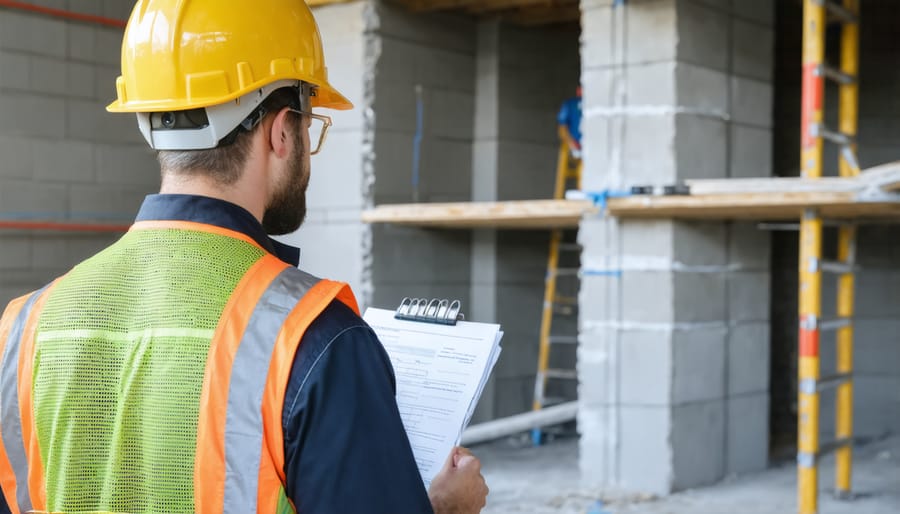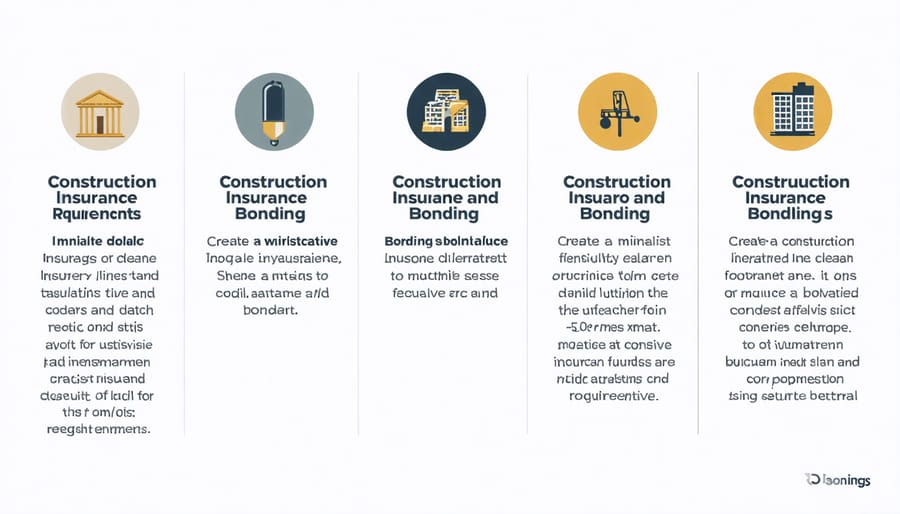Navigate Virginia’s complex construction landscape with confidence by mastering the Commonwealth’s stringent regulatory framework. Construction professionals operating in Virginia must comply with the Department of Professional and Occupational Regulation (DPOR) requirements, including mandatory licensing for projects exceeding $1,000 and strict adherence to the Virginia Uniform Statewide Building Code (USBC).
Virginia’s construction laws encompass three critical areas: licensing requirements, safety regulations, and contract compliance. Class A, B, and C contractor licenses correspond to project values exceeding $120,000, between $10,000-$120,000, and under $10,000, respectively. Each classification demands specific qualifications, financial documentation, and continuing education requirements to maintain active status.
Recent legislative updates have strengthened worker protection measures, including enhanced safety protocols for excavation work, fall protection standards, and comprehensive worksite inspection requirements. Construction professionals must also navigate local jurisdiction requirements, zoning restrictions, and environmental regulations that vary significantly across Virginia’s diverse regions, from coastal areas to mountainous terrain.
For construction industry stakeholders, understanding these legal requirements isn’t just about compliance—it’s essential for project success, risk management, and maintaining professional credibility in Virginia’s competitive construction market. This comprehensive guide examines current laws, recent changes, and practical implications for construction operations throughout the Commonwealth.

Licensing and Registration Requirements
Contractor Classification System
Virginia employs a three-tier classification system for contractors based on project value and complexity. Class A contractors represent the highest level of licensure, permitting them to work on projects of any value, typically those exceeding $120,000. These contractors must demonstrate extensive experience, strong financial standing, and pass advanced business and trade examinations.
Class B contractors are authorized to handle projects valued between $10,000 and $120,000 per single contract, with an annual total not exceeding $750,000. They must show appropriate business acumen and pass relevant trade examinations, though requirements are less stringent than Class A.
Class C contractors work on smaller projects valued between $1,000 and $10,000 per single contract, with a yearly maximum of $150,000. While this classification has the least demanding requirements, contractors must still demonstrate basic business knowledge and trade competency.
Each classification requires specific prerequisites, including:
– Designated employee passing applicable examinations
– Proof of financial stability
– Demonstration of relevant experience
– Compliance with state insurance requirements
– Clean record regarding prior violations
Contractors must maintain their classification requirements continuously and may face penalties for performing work beyond their licensed class limits. Upgrading to a higher classification requires meeting additional qualifications and submitting a new application to the Virginia Board for Contractors.
Specialty Trade Licenses
In Virginia, specialty trade contractors must obtain specific licenses based on their area of expertise. The Virginia Department of Professional and Occupational Regulation (DPOR) oversees these licenses, which are categorized into distinct specialties including electrical, plumbing, HVAC, gas fitting, and asbestos removal.
For electrical contractors, certification requirements include completing a master electrician examination and documenting at least five years of hands-on experience. Plumbing contractors must demonstrate similar expertise through examination and practical experience, while HVAC contractors need specialized training in mechanical systems and energy compliance.
Each specialty license has three classification levels: Class C (up to $10,000 per project), Class B ($10,000 to $120,000 per project), and Class A (over $120,000 per project). Contractors must maintain their licenses through continuing education and renewal every two years.
Additional specialty designations include:
– Fire sprinkler fitting
– Electronic security systems
– Elevator maintenance
– Lead abatement
– Underground utility excavation
To maintain compliance, contractors must carry appropriate insurance coverage and ensure all employed tradespeople hold valid journeyman or master certificates in their respective fields. Violations of licensing requirements can result in significant penalties, including fines and license suspension. Regular updates to trade qualifications may be required as building codes and safety standards evolve.
Building Codes and Safety Regulations
Virginia Uniform Statewide Building Code
The Virginia Uniform Statewide Building Code (USBC) serves as the cornerstone of construction regulation in the Commonwealth, establishing comprehensive standards for building safety, accessibility, and energy efficiency. Recent Virginia’s building code updates have incorporated the 2021 International Building Code (IBC) with state-specific amendments, making compliance even more crucial for construction professionals.
The USBC consists of three primary components: the Virginia Construction Code, the Virginia Existing Building Code, and the Virginia Maintenance Code. These components work together to ensure that new construction, renovations, and existing structures meet essential safety requirements while promoting sustainable building practices.
Key compliance measures include mandatory plan reviews, permits, and inspections throughout various construction phases. Projects must undergo thorough examination by local building officials who verify compliance with structural requirements, fire safety provisions, mechanical systems, and electrical installations. Special attention is given to requirements for energy conservation, accessibility standards under the Americans with Disabilities Act (ADA), and specific provisions for high-risk occupancies.
Construction professionals must maintain detailed documentation of compliance efforts, including approved plans, permits, inspection reports, and any variance approvals. The code also mandates specific qualifications for contractors and specialized tradespersons performing work under its provisions.
Violations of the USBC can result in significant penalties, including stop-work orders, fines, and potential license suspension. Therefore, staying current with code requirements and maintaining proper documentation is essential for successful project completion and regulatory compliance.

Safety Standards and OSHA Compliance
In Virginia, construction safety standards operate under a dual system of federal and state oversight. Construction companies must comply with both OSHA safety requirements and Virginia-specific regulations enforced by the Virginia Occupational Safety and Health (VOSH) program.
VOSH maintains stringent requirements that often exceed federal standards, particularly in areas such as fall protection, confined space entry, and trenching operations. Construction sites must implement comprehensive safety programs that include regular safety meetings, proper documentation of incidents, and maintaining detailed records of safety training.
Key Virginia-specific safety requirements include:
– Mandatory written safety programs for sites with more than 10 employees
– Site-specific fall protection plans for work at heights above 6 feet
– Enhanced scaffolding inspection protocols
– Stricter requirements for crane operations and operator certification
– Specific documentation requirements for excavation permits
Construction employers must conduct regular workplace inspections, provide appropriate personal protective equipment (PPE), and ensure all workers receive proper safety training. VOSH conducts routine inspections and can levy substantial fines for violations, which may be significantly higher than federal OSHA penalties.
Companies must also maintain emergency action plans, provide adequate first-aid facilities, and implement heat illness prevention measures during Virginia’s summer months. Compliance officers emphasize the importance of maintaining detailed documentation of all safety-related activities, as these records are crucial during inspections and investigations.
Contract Requirements and Dispute Resolution
Mandatory Contract Provisions
Virginia law mandates specific provisions that must be included in construction contracts to ensure legal compliance and protect all parties involved. The contract must clearly state the contractor’s name, address, and license number, along with detailed scope of work specifications that align with established construction quality standards.
Payment terms must be explicitly outlined, including the total contract amount, payment schedule, and conditions for final payment. For residential projects exceeding $1,000, the contract must include a detailed notice of the consumer’s right to cancel within three business days.
The contract should specify project timelines, including start and completion dates, along with provisions for reasonable extensions due to unforeseen circumstances. Insurance requirements and warranty information must be clearly stated, including coverage limits and duration of warranties.
Change order procedures must be documented, requiring written authorization before any modifications to the original scope. The contract should also address dispute resolution methods and include provisions for mechanics’ liens rights and notices.
For contracts valued at $10,000 or more, a written statement about the contractor’s compliance with workers’ compensation insurance requirements is mandatory. Additionally, all contracts must include provisions for permits, inspections, and compliance with local building codes.
Dispute Resolution Mechanisms
Virginia’s construction industry relies on several established construction dispute resolution procedures to address conflicts efficiently and cost-effectively. The primary mechanisms include mediation, arbitration, and litigation, with mediation often being the preferred initial approach due to its collaborative nature and lower costs.
The Virginia Code mandates that construction contracts include specific dispute resolution provisions, particularly for public projects. These provisions typically outline a hierarchical approach, starting with informal negotiations between parties, followed by structured mediation, and finally moving to binding arbitration or litigation if necessary.
For claims under $50,000, parties can utilize the Virginia General District Court’s simplified procedures. Larger disputes often proceed through the Circuit Court system, where specialized construction law judges may be assigned to complex cases.
Alternative Dispute Resolution (ADR) methods are strongly encouraged by Virginia courts, with many jurisdictions requiring attempted mediation before proceeding to trial. The Virginia Department of General Services maintains a pre-approved panel of construction mediators and arbitrators with industry-specific expertise.
Time limitations for filing claims are strictly enforced, with most construction disputes subject to a five-year statute of limitations for written contracts and three years for oral agreements. Prompt notice requirements and documentation of claims are crucial for preserving legal rights and ensuring successful dispute resolution.

Insurance and Bonding Requirements
Minimum Insurance Coverage
In Virginia, construction contractors must maintain specific insurance coverage to operate legally and protect against potential liabilities. General Contractors are required to carry General Liability Insurance with minimum coverage of $500,000 per occurrence for bodily injury and property damage. For contractors working on public projects, the coverage requirement increases to $1 million per occurrence.
Workers’ Compensation Insurance is mandatory for construction companies with three or more employees, covering medical expenses and lost wages for work-related injuries. Contractors must also maintain Commercial Auto Insurance with minimum liability coverage of $50,000 for property damage and $100,000 for bodily injury per person.
Professional contractors engaging in specialized work, such as electrical or plumbing, may need additional coverage specific to their trade. Builder’s Risk Insurance, while not legally required, is strongly recommended for new construction projects, typically covering the structure’s value during construction.
Contractors should regularly review their insurance policies to ensure compliance with state requirements and project-specific needs. Failure to maintain adequate insurance coverage can result in license suspension, project delays, and potential legal liabilities.
Bonding Regulations
In Virginia, contractors must secure performance and payment bonds for public construction projects valued at $500,000 or more. The performance bond guarantees project completion according to specifications, while the payment bond ensures subcontractors and suppliers receive compensation for their work and materials.
For state and local government projects, the bond amount typically equals 100% of the contract value. Federal projects follow the Miller Act requirements, maintaining the same percentage requirement. Private projects may have different bonding requirements based on contract specifications and owner preferences.
Small construction businesses may qualify for the Virginia SWaM program, which can provide alternatives to traditional bonding requirements on certain state projects. However, these alternatives must still provide adequate protection for project stakeholders.
Contractors should note that bond requirements can vary by locality and project type. Cities and counties may impose additional bonding regulations beyond state requirements. Surety companies issuing these bonds must be authorized to conduct business in Virginia and maintain specified financial ratings.
Professional construction managers and design-build contractors may face additional bonding requirements depending on their scope of services and contract obligations.
Environmental and Zoning Regulations
Construction projects in Virginia must comply with both state environmental regulations and local zoning regulations. The Virginia Department of Environmental Quality (DEQ) oversees environmental compliance, requiring permits for activities that may impact air quality, water resources, or soil conditions.
Projects disturbing one acre or more must obtain Virginia Stormwater Management Program (VSMP) permits and implement erosion and sediment control measures. Contractors must develop and maintain a Stormwater Pollution Prevention Plan (SWPPP) throughout the construction phase.
Local jurisdictions maintain specific requirements for setbacks, building height restrictions, and land use designations. Construction professionals must obtain proper zoning clearances and variances before commencing work. Key considerations include:
– Wetland protection and mitigation requirements
– Chesapeake Bay Preservation Act compliance in applicable areas
– Archaeological and historic preservation assessments
– Tree conservation and landscaping requirements
– Buffer zone maintenance between different land uses
– Noise ordinance compliance during construction
Environmental impact assessments may be required for larger projects or those in environmentally sensitive areas. These assessments evaluate potential effects on local ecosystems, watershed management, and air quality.
Virginia’s coastal regions have additional regulations under the Coastal Zone Management Program, requiring special permits and environmental considerations for construction near shorelines or in flood-prone areas.
Contractors should conduct thorough due diligence regarding environmental and zoning requirements during the project planning phase. This includes consulting with local planning departments, environmental agencies, and qualified environmental consultants to ensure full compliance and avoid costly delays or penalties.
Regular environmental monitoring and documentation throughout the construction process are essential for maintaining compliance and addressing any issues that arise during development.

Understanding and complying with Virginia’s construction laws is crucial for successful project execution and maintaining good standing in the industry. Key requirements include obtaining proper licensing through the Virginia Board for Contractors, maintaining adequate insurance coverage, and ensuring workplace safety compliance with both state and federal OSHA regulations.
To maintain compliance, construction professionals should:
– Regularly review and update licenses and certifications
– Keep detailed records of all permits, inspections, and safety protocols
– Stay informed about changes in building codes and regulations
– Implement comprehensive safety training programs
– Maintain proper insurance coverage
– Use written contracts that meet Virginia’s legal requirements
– Establish clear communication channels with regulatory bodies
Success in Virginia’s construction industry depends on balancing technical expertise with legal compliance. By following these guidelines and maintaining proper documentation, construction professionals can minimize legal risks while maximizing project success. Remember that regulations evolve, so staying connected with industry associations and seeking legal counsel when needed are essential practices for long-term success in Virginia’s construction sector.

